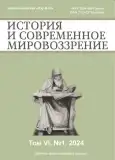Russian Revolutionaries and Russian Old Believers: From Sympathy to Repression. Part 1. Statement of the Problem. First Period
- Authors: Kerov V.V.1
-
Affiliations:
- Russian Presidential Academy of National Economy and Public Administration
- Issue: Vol 6, No 1 (2024)
- Pages: 13-19
- Section: DEBATING ISSUES OF HISTORY
- URL: https://journals.eco-vector.com/2658-4654/article/view/630535
- DOI: https://doi.org/10.33693/2658-4654-2024-6-1-13-19
- EDN: https://elibrary.ru/CSOUWG
- ID: 630535
Cite item
Abstract
The purpose of this work is to clarify the reality or mythology of the position about the active participation of Old Believers in the anti-government movement in the second half of the 19th — early 20th centuries. An analysis of sources showed that the Old Believers never took an anti-state position, showing only their loyalty to state power. During the period under review they rejected the revolutionaries' claims to cooperation. Only during the Civil War did the Old Believers side with one of the warring parties, which, in the absence of a single supreme power, cannot be assessed as anti-state activity. Soon after the Bolshevik victory, the Old Believers took an unambiguously favorable position towards the Soviet regime, despite the previous brutal repressions. At the same time, the Russian revolutionary intelligentsia during the second half of the 19th century retained illusions regarding the Old Believers and unsuccessfully tried to attract them to the fight against the samoderzhaviye. The democratic revolutionaries of the 60s turned to the clergy of the Old Believers, and the populist revolutionaries of the 70s also tried to work with the broad Old Believer masses, primarily peasants, to no avail.
Full Text
About the authors
Valeriy V. Kerov
Russian Presidential Academy of National Economy and Public Administration
Author for correspondence.
Email: vvkerov@gmail.com
ORCID iD: 0000-0003-4853-1102
Dr. Sci. (Hist.), Professor, Professor of the Department of Social and Economic History of Russia, Doctor of Historical Sciences
Russian Federation, MoscowReferences
- Kerov V.V. «The people’s liberation has not yet taken place completely»: Old Believers and the Third June Monarchy // Russian History. 2023. No. 4. P. 136–152;
- Kerov V.V. Russian history through the prism of the Old Believer factor // Russian history. 2014. No. 4. P. 203–213;
- Klyukina Yu.V. Old Believers and political parties (1905–1917) // Problems of Russian history. Ekaterinburg: Volot, 2003. Vol. 5: At the crossroads of eras and traditions. pp. 327–348;
- Manuel, abbot. (Chibisov A.V.) Belokrinitsky hierarchy in 1846–1988: stages of history. Kostroma: DiAr, 2017. 464 p.
- Perekrestov R.I. From the history of the relationship between the Old Believers and the circle of A.I. Herzen // Old Believers: history, culture, modernity. M.: Museum of History and Culture of the Old Believers, 2012. Vol. 14. pp. 32–33.
- Perekrestov R.I. Xenos. Klintsy: Publishing house «Klintsovskaya mountains. type», 2013. Book. 1. 608 p.
- Pyzhikov A.V. Facets of the Russian schism. Notes about our history from the 17th century to 1917. M.: Drevokhranishche, 2013. 646 p.
- Sarkisyants M. Russia and messianism. Towards the «Russian idea» N.A. Berdyaev / per. with him. SPb.: Publishing house St. Petersburg. Univ., 2005. 272 p.
- Shakhnazarov O. L. Roots of Russian socialism // Questions of philosophy. 2007. No. 6. P. 24–37;
- Shakhnazarov O. L. Attitude to property among the Old Believers (before 1917) // Questions of history. 2004. No. 4. P. 53–70;
- Shakhnazarov O. L. Old Believers and Bolshevism // Questions of history. 2002. No. 4. P. 72–98;
- Yukhimenko E. M. Old Believer Center behind the Rogozhskaya Outpost. M.: Languages of Slavic culture, 2005. 239 p.
Supplementary files











